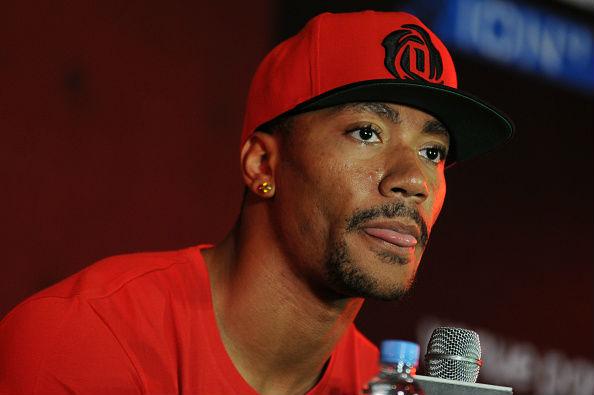Derrick Rose gang rape case: Judge orders woman to drop her anonymity so jury doesn't think court is on her side
No more Jane Doe. From now on the alleged survivor of sexual assault has to use her real name

Your support helps us to tell the story
From reproductive rights to climate change to Big Tech, The Independent is on the ground when the story is developing. Whether it's investigating the financials of Elon Musk's pro-Trump PAC or producing our latest documentary, 'The A Word', which shines a light on the American women fighting for reproductive rights, we know how important it is to parse out the facts from the messaging.
At such a critical moment in US history, we need reporters on the ground. Your donation allows us to keep sending journalists to speak to both sides of the story.
The Independent is trusted by Americans across the entire political spectrum. And unlike many other quality news outlets, we choose not to lock Americans out of our reporting and analysis with paywalls. We believe quality journalism should be available to everyone, paid for by those who can afford it.
Your support makes all the difference.A Los Angeles judge in the gang rape case surrounding basketball star Derrick Rose has ordered the plaintiff to use her real name if she wants the case to proceed.
The plaintiff, known as Jane Doe, accused the men, including his friends Randall Hampton and Ryan Allen, of drugging her at a party in August 2013, then entering her apartment and gang raping her while she was unconscious. The men have denied the allegations and said they had consensual sex with her.
The US district judge, Michael Fitzgerald, made the ruling for the plaintiff to drop her anonymity on Tuesday after a 13-month legal battle, as reported by the Associated Press.
He said the law was "very clear on the issue" and he would not close his court room to protect her identity.
Ms Doe told ThinkProgress last week that one reason she wanted to remain anonymous was to protect her elderly parents who still did not know about the alleged assault.
“They’re elderly and I’m a part-time caregiver for my mother, so it’s very important for me to do everything I can to make sure that my family’s needs are met and they’re still in good standing and have no stress or pressure placed on them,” she said.
Rose’s lawyers argued the lawsuit was “not a rape case”.
“It’s pure and simple extortion by a plaintiff who wants to hide behind the cloak of anonymity while seeking millions in damages from a celebrity with whom she was in a long-term nonexclusive consensual sexual relationship,” they said in August.
They also pointed to Ms Doe depicting herself in a “sexual” manner on Instagram and Twitter, which they said undermined her desire to remain anonymous.
The judge did not agree that the plaintiff’s manner on social media was a valid argument.
“Defendant Rose appears to suggest that women who publicly portray themselves as 'sexual' are less likely to experience embarrassment, humiliation, and harassment associated with gang rape. Such rhetoric has no place in this Court,” he said.
The judge said, however, that if the court agreed to allow the plaintiff to remain anonymous, the jury could interpret that as a “comment on the harm defendants allegedly caused”.
Ms Doe’s lawyers attempted a compromise where her real name could only be used in court and not by the media. That compromise was rejected.
The NBA star’s lawyers added that media restrictions were unnecessary as the media had “lost interest” in the case.
Ms Doe, if she does not wish to use her real name, might choose to settle the case.
In June, Rose’s lawyers filed a motion for the case to be thrown out. It was rejected by the judge, who was concerned as to whether Ms Doe had consented to sexual intercourse.
Rose and Ms Doe had been dating for a year and a half in a non-exclusive relationship.
Rose allegedly pressured Ms Doe into sending him naked videos, to masturbate on Skype and asked her to buy a sex toy, according to court documents. He also allegedly requested she join him in group sex, which she had refused.
On the night of the alleged rape, the woman had a blood alcohol level of 2.5 times the driving limit.
Her friend, Jessica Groff, who went with her to a party at Rose’s house earlier that night, said it was “very obvious” that she was intoxicated. She escorted her friend home as she claimed it was “not safe” to leave her alone at the party.
Doe and Ms Rose sent text messages that night. Rose came over with his two friends to pick her up in a taxi and take her back to the party. Court documents show the plaintiff stopped responding to text messages and calls by the time they had arrived at her house.
In the morning, she said she woke up in a messy bed covered with lubricant.
Join our commenting forum
Join thought-provoking conversations, follow other Independent readers and see their replies
Comments